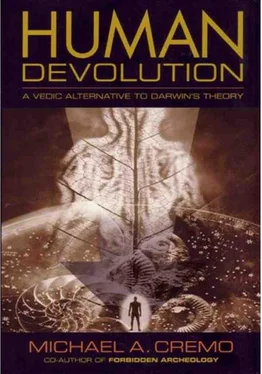Michael Cremo - Human Devolution - A Vedic Alternative To Darwin's Theory
Здесь есть возможность читать онлайн «Michael Cremo - Human Devolution - A Vedic Alternative To Darwin's Theory» весь текст электронной книги совершенно бесплатно (целиком полную версию без сокращений). В некоторых случаях можно слушать аудио, скачать через торрент в формате fb2 и присутствует краткое содержание. Год выпуска: 2003, ISBN: 2003, Издательство: Torchlight Publishing, Жанр: Старинная литература, на английском языке. Описание произведения, (предисловие) а так же отзывы посетителей доступны на портале библиотеки ЛибКат.
- Название:Human Devolution: A Vedic Alternative To Darwin's Theory
- Автор:
- Издательство:Torchlight Publishing
- Жанр:
- Год:2003
- ISBN:9780892133345
- Рейтинг книги:4 / 5. Голосов: 1
-
Избранное:Добавить в избранное
- Отзывы:
-
Ваша оценка:
- 80
- 1
- 2
- 3
- 4
- 5
Human Devolution: A Vedic Alternative To Darwin's Theory: краткое содержание, описание и аннотация
Предлагаем к чтению аннотацию, описание, краткое содержание или предисловие (зависит от того, что написал сам автор книги «Human Devolution: A Vedic Alternative To Darwin's Theory»). Если вы не нашли необходимую информацию о книге — напишите в комментариях, мы постараемся отыскать её.
Human Devolution: A Vedic Alternative To Darwin's Theory — читать онлайн бесплатно полную книгу (весь текст) целиком
Ниже представлен текст книги, разбитый по страницам. Система сохранения места последней прочитанной страницы, позволяет с удобством читать онлайн бесплатно книгу «Human Devolution: A Vedic Alternative To Darwin's Theory», без необходимости каждый раз заново искать на чём Вы остановились. Поставьте закладку, и сможете в любой момент перейти на страницу, на которой закончили чтение.
Интервал:
Закладка:
Huxley leaned toward one of his companions and said, “The Lord hath delivered him into my hands” (Meacham 1970, p. 216). When he was called to speak, Huxley delivered his famous retort, quoted in many books about evolution. Declaring that he felt no shame in having an ape for an ancestor, he added, “If there were an ancestor whom I should feel shame in recalling, it would rather be a man —a man of restless and versatile intellect—who, not content with success in his own sphere of activity, plunges into scientific questions with which he has no real acquaintance, only to obscure them by an aimless rhetoric, and distract the attention of his hearers from the real point at issue by eloquent digressions and skilled appeals to religious prejudice” (Meacham 1970, p. 216).The audience, won over by Huxley, broke into loud applause. In their opening skirmish, the apes had prevailed over the angels.
The angels, however, still had some highly placed advocates. On November 25, 1864, Benjamin Disraeli, then chancellor of the exchequer and soon to be prime minister, said at a speech at the Sheldon Theater in Oxford: “The question is this—Is man an ape or an angel? My Lord, I am on the side of the angels. I repudiate with indignation and abhorrence the contrary view, which is, I believe, foreign to the conscience of humanity: more than that, even in the strictest intellectual point of view, I believe the severest metaphysical analysis is opposed to such a conclusion. But what does the Church teach us? What is its interpretation of the highest nature? It teaches us that man is made in the image of his Creator—a source of inspiration and of solace from which only can flow every right principle and every Divine truth . . . It is between these two contending interpretations of the nature of man [ape or angel], and their consequences, that society will have to decide” (Monypenny and Buckle 1929, p. 108). But Oxford University had already decided. Disraeli’s remarks, especially the one about being on the side of the angels, met with loud disapproving laughter that today still echoes with increased volume in the halls of academia.
Disraeli’s unsympathetic university audience had two components. First, there were theologians who had given up a literal reading of the Bible. Second, there were scientists who were also rejecting Biblical literalism, from the standpoint of Darwinism. They both reacted with dislike to Disraeli’s talk of angels (Monypenny and Buckle 1929, pp. 104–109). Indeed, it was the unwitting alliance between these two groups that insured the relatively quick triumph of Darwinism over the Wilberforces and Disraelis of Victorian England. Within a few decades, most of the educated persons of England, and the world, whatever their religious or cultural heritages, would accept that human bodies were not direct creations of God in His image but were instead the modified bodies of apes. Disraeli’s statement that he was “on the side of the angels” is often inserted, as an amusement, into books on evolution, and so is a satirical Punch cartoon of Disraeli dressed as an angel (Ruse 1982, p. 54).
But what exactly did Disraeli mean when he spoke of being on the side of the angels? Was this merely a metaphor, pointing to some vague involvement of God in the origin of the human species? Given the intellectual climate of his times, one is tempted to answer the question positively. For most intellectuals, God had already retreated from the visible universe, taking the role of a detached clockmaker who set a strictly material machine in motion and left it running. But a deeper study of Disraeli’s writings lends support to a more literal reading of his remarks.
In lord George Bentinck: a Political Biography, Disraeli (1852, pp.
495–496) spoke fondly of “the early ages of the world, when the relations of the Creator with the created were more intimate than in these days, when angels visited the earth, and God Himself even spoke with man.”
Similar passages can be found in Disraeli’s novels, which were fairly transparent vehicles for his own political, philosophical, and spiritual convictions. In Tancred, published in 1847, his visionary hero, a young Victorian aristocrat, has the following exchange with a bishop of the Church of England (Disraeli 1927, p. 76).
“‘The Church represents God upon earth,’ said the bishop. “‘But the Church no longer governs man,’ replied Tancred.
“‘There is a great spirit rising in the Church,’ observed the bishop with thoughtful solemnity. . . . ‘We shall soon see a bishop at Manchester.’
“‘But I want to see an angel at Manchester.’ “‘An angel!’
“‘Why not? Why should there not be heavenly messengers, when heavenly messages are most wanted?’”
Tancred then proceeds on a spiritual quest to Jerusalem. While in Palestine, he ascends Mt. Sinai by night and is visited by an angel “vast as the surrounding hills.” After identifying himself as “the angel of Arabia,” the angel says, “‘The relations between Jehovah and his creatures can be neither too numerous nor too near. In the increased distance between God and man have grown up all those developments that have made life mournful’” (Disraeli 1927, p. 300).
Eventually,Tancred forms a plan to revitalize Europe by first restoring the spiritual purity of Asia. “When the East has resumed its indigenous intelligence, when angels and prophets shall again mingle with humanity, the sacred quarter of the globe will recover its primeval and divine supremacy; it will act upon the modern empires, and the faint-hearted faith of Europe, which is but the shadow of a shade, will become as vigorous as befits men who are in sustained communication with the Creator” (Disraeli 1927, p. 441). Disraeli’s vision of a Creator and his angels constantly interfering with the world is far less compatible with Darwinism than the vision of a Creator who keeps his angels in heaven and his hands off the world.
Given his mystical tendency, it is not surprising that Disraeli disliked materialistic evolutionary theories. Tancred appeared before Darwin’s The Origin of Species, but in it Disraeli satirized Robert Chambers’s vestiges of Creation, which also expressed evolutionary ideas.
Before setting off to the East, Tancred developed a temporary affection for beautiful young Lady Constance, whom Tancred regarded as his spiritual guide. One evening Lady Constance spoke to him with effusive praise about a book titled, presciently, The Revelations of Chaos (Disraeli 1927, pp. 112–113).
“‘To judge from the title, the subject is rather obscure,’ said Tancred. “‘No longer so,’ said Lady Constance. ‘It is treated scientifically; everything is explained by geology and astronomy, and in that way. It shows you exactly how a star is formed; nothing can be so pretty! A cluster of vapour, the cream of the milky way, a sort of celestial cheese, churned
into light, you must read it, ’tis charming.’
“‘Nobody ever saw a star formed,’ said Tancred.
“‘Perhaps not. You must read the Revelations; it is all explained. But what is most interesting, is the way in which man has been developed. You know, all is development. The principle is perpetually going on. First, there was nothing, then there was something; then, I forget the next, I think there were shells, then fishes; then we came, let me see, did we come next? Never mind that; we came at last. And the next change there will be something very superior to us, something with wings. Ah! that’s it; we were fishes, and I believe we shall be crows. But you must read it.’
“‘I do not believe I ever was a fish,’ said Tancred.
“‘Oh, but it is all proved; you must not argue on my rapid sketch; read the book. It is impossible to contradict anything in it. You understand, it is all science; it is not like those books in which one says one thing and another the contrary, and both may be wrong. Everything is proved: by geology, you know. You see exactly how everything is made; how many worlds there have been; how long they lasted; what went before, what comes next. We are a link in the chain, as inferior animals were that preceded us: we in turn shall be inferior; all that will remain of us will be some relics in a new red sandstone. This is development. We had fins; we may have wings. . . .’
Читать дальшеИнтервал:
Закладка:
Похожие книги на «Human Devolution: A Vedic Alternative To Darwin's Theory»
Представляем Вашему вниманию похожие книги на «Human Devolution: A Vedic Alternative To Darwin's Theory» списком для выбора. Мы отобрали схожую по названию и смыслу литературу в надежде предоставить читателям больше вариантов отыскать новые, интересные, ещё непрочитанные произведения.
Обсуждение, отзывы о книге «Human Devolution: A Vedic Alternative To Darwin's Theory» и просто собственные мнения читателей. Оставьте ваши комментарии, напишите, что Вы думаете о произведении, его смысле или главных героях. Укажите что конкретно понравилось, а что нет, и почему Вы так считаете.












